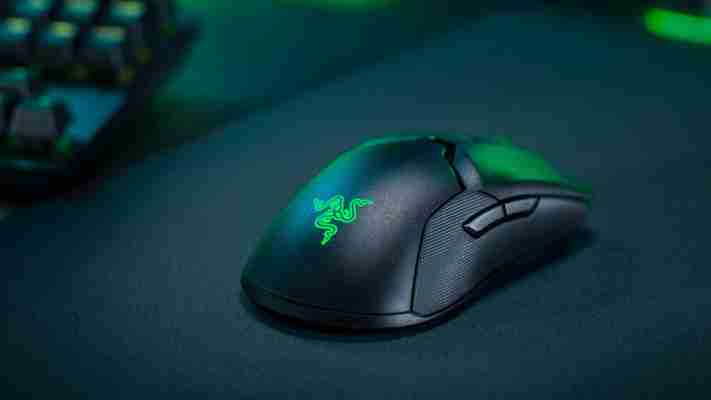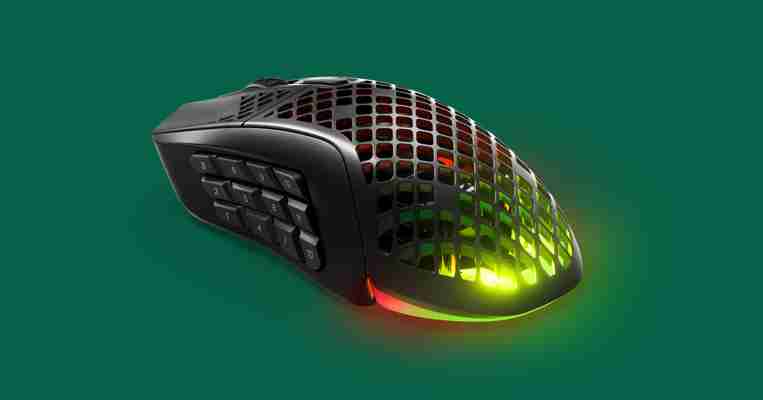Wired vs wireless mouse: Which is better for gaming?
The wireless mouse has come a long way technologically and has improved over the years. If wired and wireless mice were compared five years ago, there would be no doubt that the former is preferred, as the latency on wireless types would make gaming frustrating.

The perception of wireless mice has changed today, and they are a competition to wired mice. They give a lot of advantages, as the latter can be inconvenient at times.
Pros and cons of both mouse types
Professional esports gamers are slowly edging towards using wireless mice over wired ones due to several reasons that give them an advantage while playing. Nobody likes a cable latched onto their mice, which increases resistance and reduces total control.
Convenience
The Razer Deathadder V2 X runs on AA and AAA batteries (Image via Razer)
A wired mouse will never run out of battery, as it does not need one. It is always connected via a cable, and the assurance of it never losing power is great.
Though batteries are super-efficient in wireless mice, with some lasting up to 200+ hours and some wireless mice can be used while charging. Worrying about changing batteries or putting it up for charge is always at the back of a player's mind, and when in the middle of a game, running out of power is the last thing they want.
Also, a mouse without a cable is more convenient to use. Users have more freedom to move around and still be connected. The cable is not there to pull on their mouse and ruin their aim.
Latency
Most wireless mice connect via a 2.4 GHz USB dongle, which provides low latency. Bluetooth connection is also an option, but latency is higher.
Here, the latency is as low as 1ms, making it unnoticeable and completely smooth, whereas the latency of wired mice can be as low as 0.25ms, making it four times faster than a wireless one.
But a difference of 0.75ms will not make a difference in real-life scenarios.
Price
As wireless mice are still picking up the pace in today's market, they are comparatively costlier than wired ones. An adequate wired gaming mouse can be bought for $25, whereas a wireless version of the same mouse would start from $50.
Features
Both types of mice offer the same features, including top-notch sensors, many buttons, and RGB. In this case, both wired and wireless are equal. In a wireless mouse, gamers will need to take care of a tiny USB receiver that can be easily lost. Wireless mice can also connect to multiple devices through Bluetooth for easy switching, whereas a wired one is limited to one gadget.
Conclusion
It comes down to preference (Image via Razer)
Wireless mice are the way to go for gaming if players are willing to charge them regularly and pay a heftier price. Wired mice are a good option if users do not travel often and have only one device to use.
At the end of the day, the performance does not draw a line between these two types, and the choice is down to individual preference.
Poll : 0 votes
Wired vs wireless gaming mice: key differences explained
Audio player loading…

If you are a PC gamer then it's highly likely that you have come across the age-old debate of whether a wired or wireless mouse is better for your needs. It's a thorny issue and one that, until fairly recently, would have only had one firm answer: wired, for ever and ever.
Having a wired mouse means you don't have to worry about connectivity as it's physically tethered to your PC. The worry about battery issues goes away, too, and as for response times - well, wired would always win out, right?
Until as recently as 2016, that argument held a lot of weight and you would have found it hard to find a PC gamer that favoured a wireless mouse over a wired one. But then something happened that turned heads and changed the perception of the wireless mouse forever.
In 2016, the Logitech G900 Chaos Spectrum launched and, with it, Logitech made the bold claim that the mouse was the fastest on the market. Not the fastest 'wireless' mouse, but the fastest mouse.
"We talked with eSports pros and none of them love the cable on a wired mouse," said Ujesh Desai vice president and general manager of gaming at Logitech at the time (opens in new tab).
"They wish they had the freedom of wireless but the performance and reliability of a wired mouse. So that was the design goal we gave our engineers, to build a wireless gaming mouse that was faster than the competition's wired gaming mice. G900 delivers on this promise, and we're confident it's the best gaming mouse we've ever built."
Reviews at the time confirmed that the mouse lived up to its hype, shifting the balance of the wired vs wireless argument somewhat. That was four years ago and wireless technology has advanced even more since then.
But it's not just connectivity that's a factor when buying one of the best gaming mouse. There are many more decisions you have to consider.
Here are some of the key differences explained when it comes to buying a wireless mouse, compared to a wired one.
The Logitech G900 Chaos Spectrum wireless mouse (Image credit: Logitech)
Cable or no cable?
A wired mouse, by its very definition, has a cable. This cable has traditionally meant that things like input lag aren't an issue as your mouse plugs straight into a USB port (or PS/2 port if you are old school) and there's minimal input lag with a wired mouse.
Most wireless gaming mice connect to a computer via a USB connector using a 2.4GHz connection, but low-latency Bluetooth is also a consideration and many will actually come with a wire as well. If you invest in a decent dedicated wireless gaming mouse, then latency really shouldn't be an issue.
While traditionalists will always choose wired, there are benefits of having a truly wireless setup. A cable can cause resistance when gaming and this is something to take into consideration. The friction from a cable could be the difference between a win or loss in the heat of a particularly furious online battle.
Accuracy counts
Whether you choose a wired or wireless gaming mouse, accuracy counts. There are a number of things you should look at but it's worth noting that they are remarkably similar in both wireless and wired setups.
One major factor is DPI. This stands for 'dots per linear inch'. The idea being that the higher the DPI, the less movement you have to use to get the cursor to move. The lower the DPI and you have to give the mouse more welly to get the cursor going.
The majority of gaming mice on the market will offer somewhere between 10,000 to 20,000DPI which is a phenomenal number. But don't just take the higher number as being better.
It really depends on the type of gaming you are doing. While a higher DPI could work well for accuracy in character movement, it might not be so good for aiming a gun - if your mouse is too sensitive then aiming may well become an issue.
The good news is that most gaming mice allow you to change the DPI and sensitivity of a mouse.
Who's in charge?
One of the key differences between a wired mouse and wireless mouse is charging. A wired mouse doesn't have the inconvenience of having to be charged, while a wireless mouse will inevitably need juicing up.
For hardcore gamers this could be an issue, but many wireless mice can hold a charge that amounts to around 50 hours, even more.
Take the Corsair Harpoon RGB Wireless, which features in our best gaming mouse guide. You can get 60 hours' gameplay out of this mouse, 30 hours if you turn the RGB lighting on and use the most optimal wireless connection. And when they do need a charge, you are only looking at two to three hours.
The Corsair Harpoon RGB Wireless mouse (Image credit: TechRadar)
Gaming anywhere
Another key area where wireless and wired mice differ is the proximity to the computer. With wired mice it's obvious that you have to be near the computer because you are tethered to it.
A wireless mouse has the advantage that it can be used away from the computer - sometimes up to 30 feet without messing up the latency.
This is good for those who have taken their PC out of their bedrooms and have a living room setup. It means you can theoretically head to the couch to play your game, rather than have to stay by your desk and in your gaming chair.
Wired vs wireless gaming mice: the verdict
Because of advancements in wireless technology and battery, gaming with a wired or wireless mouse is now down to preference.
There will always be those who prefer wired and the peace of mind that comes with knowing that your mouse's connection is never going to suffer, or that a flat battery will scupper an all-night gaming session. But these things are something of a rarity now.
Wireless mouse technology now means that latency is on a par with wired brethren and the likes of Logitech, Corsair and Razer have worked hard to make sure their versions of 1.4Ghz connectivity is as stable as it can be.
Choosing the right gaming mouse is now largely down to ergonomics - how the mouse feels in the hand for you and how much you are willing to pay. These should be the first questions you ask yourself, and that itself shows how far wireless gaming mice have come.
The Best Mouse (and Mousepad) for Every Kind of Gamer
Picking a gaming mouse is a very personal endeavor. Everyone's hands are different, everyone's preferences and needs are different, and we all play different games. That's why we're lucky to live in the golden age of gaming mice, with major manufacturers pouring engineering muscle into one-upping one another. The result is a market loaded with high-quality yet relatively inexpensive mice.

We've tested quite a few, and while we can't tell you precisely which mouse is right for you—you may prefer wired or wireless, more or fewer buttons, and obviously everyone's hands are a bit different—we have a variety of recommendations. These are the best gaming mice for every kind of gamer we can think of, plus a couple of mousepads for good measure.
Be sure to also read up our other buying guides, like the Best Gaming Headsets, Best Wireless Gaming Headsets, and Best Keyboards, for more gear recommendations.
Updated February 2022: We've updated prices throughout and added the Logitech MX Master 3S, and the SteelSeries Aerox 9 Wireless/Logitech G600.
Special offer for Gear readers: Get a 1-year subscription to WIRED for $5 ($25 off). This includes unlimited access to and our print magazine (if you'd like). Subscriptions help fund the work we do every day.











